Sensor-Based IoT in Industry: Streamlining Operations
From the last few years, the Internet of Things (IoT) has been presenting new possibilities in industries. It is used in organizations for new developments in work cycles like communication, sales, production, customer service, and healthcare.
This network of interconnected devices can connect with other IoT devices and with the cloud for the purpose of data transfer.
Its increased popularity has revolutionized how businesses operate, meantime, the use of sensors is the major factor in this transformation. These smart devices can collect, store, and analyze data without any need for human intervention.
The devices play a key role in transmitting data that enables organizations to make informed decisions and streamline their operations. In this article, we will delve into how sensors-based IoT devices help businesses to streamline their processes.
Sensors in the Internet of Things
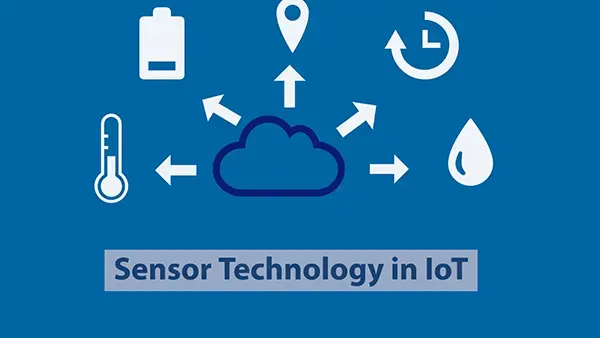
Sensors are generally used in the architecture of the Internet of Things (IoT). They can be seen as the bridge between the physical and digital worlds. These tiny devices can gather and send information, as it is the major part of IoT systems.
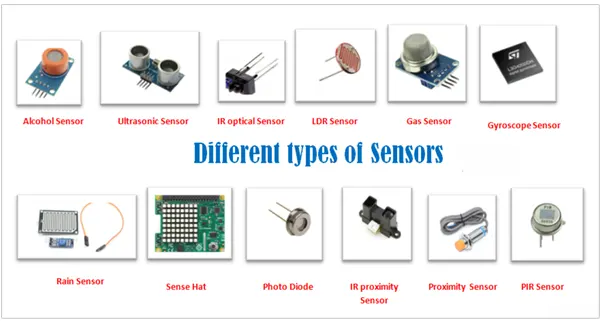
Internet of Things sensors allow companies to gather real-time data and convert it into valuable information with their capability to monitor and measure physical parameters.
Devices may differ based on their unique functionalities.
For example: They are majorly used for monitoring and controlling temperature-sensitive environments like refrigeration units.
Do You Know?:
As per Fortune Business Insights, the IoT market is going to be worth USD 3352.97 billion by 2030.
Motion detectors can sense movement and are widely employed in security systems. Whereas, pressure sensors are employed in manufacturing to keep a check on machines to avoid overload or breakdown.
Most of the time, such detectors are integrated with wireless communication technology and thus, they can upload information to the system through radio in real-time. Subsequently, this data can be reviewed, and useful information about the operation of different processes and equipment obtained.
Using internet of things development company, enterprises can recognize inefficiencies, forecast maintenance requirements, and take information-based actions to optimize their operations.
IoT sensors are used more frequently in businesses. This is because they can offer useful information, increase productivity, and cut costs. With the advancement of technology, the possibilities of such detectors in improving industrial activities are endless.
The potential of IoT and utilizing sensors can make a company stand out from its competition and be successful in the digital world today.
Impact of IoT on Businesses
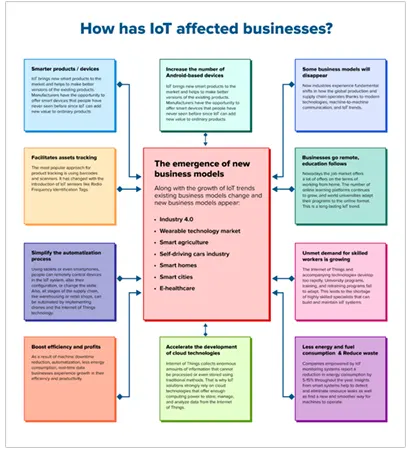
Let’s start with numbers, according to the reports by McKinsey Global Institute, it is estimated that IoT could have a potential economic impact of $3.9 trillion to $11.1 trillion per year by 2025.
Since the modern economy relies increasingly on technology and the internet, the influence of IoT on businesses is evident and it is modifying their operational approach. As an outcome, there is a burst of digital transformation, enabling companies with critical information that was not available before.
With this combination, companies can collect real-time information from different sources and act on data, making decisions to better their operations and cut costs.
Enhanced efficiency is among the vital effects of IoT on businesses. With constant data gathering from machines, equipment, and other sources, companies can pinpoint the inefficiencies and correct them as they arise. This leads to cost savings and higher efficiency.
IoT also empowers enterprises to improve their decision-making processes. Real-time data allows companies to make well-informed decisions, however, earlier these were made on assumptions or incomplete information. This results in excellent results and a competitive edge in the market.
Also, IoT technology allows businesses to monitor environmental factors and, thus, eliminate the possibility of potential threats. This also guarantees the employee good health and the company avoids accidents and liability.
Take a look at the below data showing the increasing dominance of IoT active devices.
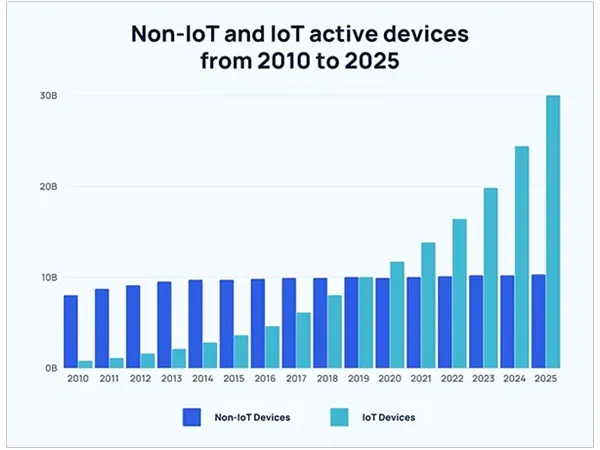
Also, sensors in inventory management and transportation have simplified operations, cut costs, and optimized efficiency. By properly monitoring stock levels and vehicle performance, enterprises can avert stockouts and save on maintenance costs.
The multidimensional effect of IoT on businesses includes benefits such as increased efficiency, better decision-making, improved safety measures, and cost savings. Adopting this technology with sensors is necessary for corporations in the modern digital age.
Streamlining Operations with the Internet of Things Sensors
Internet of Things sensors are especially beneficial in reducing the complexity of operations in almost all industries. Real-time data on machinery, equipment, and vehicles is gathered to help organizations optimize their processes as well as to enhance their speed.
Here are some practical ways the Internet of Things sensors can be utilized to streamline procedures:
Maintenance and Downtime Reduction
Maintenance determines the smooth and efficient working of industries. However, manual checks and scheduled maintenance could be time-consuming and expensive.
Internet of Things sensors provide real-time performance monitoring of machinery and equipment of the business. Detection of any possible problems helps businesses to prevent them by taking proactive measures, therefore, reducing the risk of downtime and expensive repairs.
Production Optimization
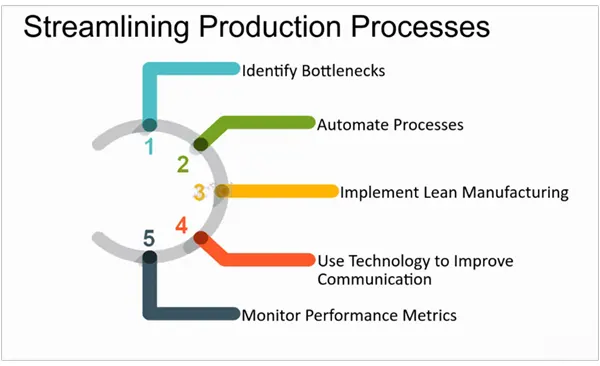
Like any other sector, the manufacturing sector also faces downtime and machine failures, which may greatly impact production efficiency. Sensors of IoT from a data collection platform can give significant information about the operation and performance of the equipment, to find areas for optimization.
Using this data, enterprises can optimize their production processes, decrease waste, and improve the level of total productivity.
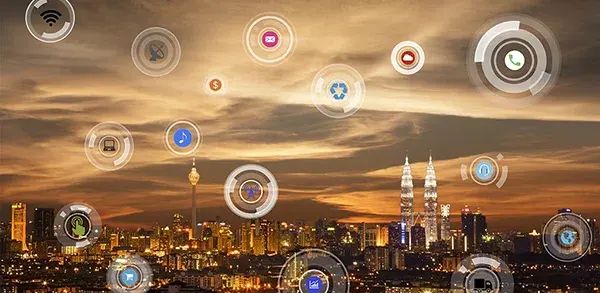
Inventory Management
Correct stock levels are required for every business. IoT sensors allow companies to track levels of stock in real time and minimize the potential of stock outs or overstocking. Eventually, this can save costs and enable uninterrupted operations.
Fleet Optimization
In the transport sector, Internet of Things sensors are installed in vehicles to track driving characteristics, route effectiveness, and vehicle performance. With such data, businesses can achieve optimal fleet operations by reducing the amount of fuel consumed and saving costs.
Did you know?
Global energy IoT is anticipated to reach $75.3 billion by 2026.
Workplace Safety
Even, safety for employees can be ensured by Internet of Things sensors. How? To answer, environmental factors like temperature and humidity can be controlled. Hence, companies therefore implement this control to ensure the well-being of their employees and avoid mishappenings.
These devices can identify possible dangers, for example, gas leaks, and then send an immediate alert for businesses to act upon.
Supply Chain Management
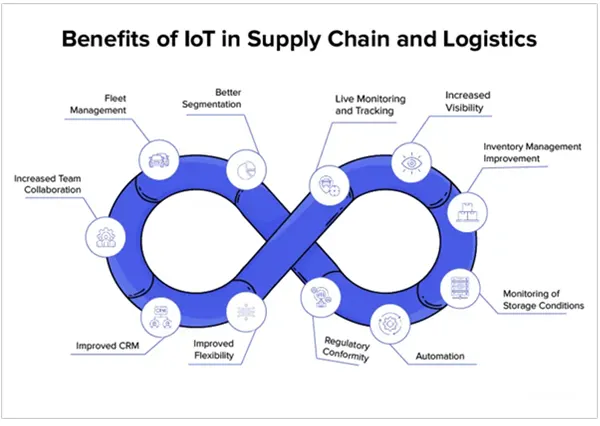
The demand for delivery in time and the transparency of the supply chain has led to the rise of Internet of Things sensors. It can offer some meaningful details about the whole process. Goods movements are followed and temperature along with humidity levels are monitored to ensure products are safely delivered and goods quality is maintained.
Conclusion
IoT sensors are an integral part of operations improvement and efficiency optimization across several industries. Through the use of data, businesses can increase their output, minimize costs, and make their workplaces safer. Embracing IoT in enterprises can give a competitive edge in this rapidly changing world.
